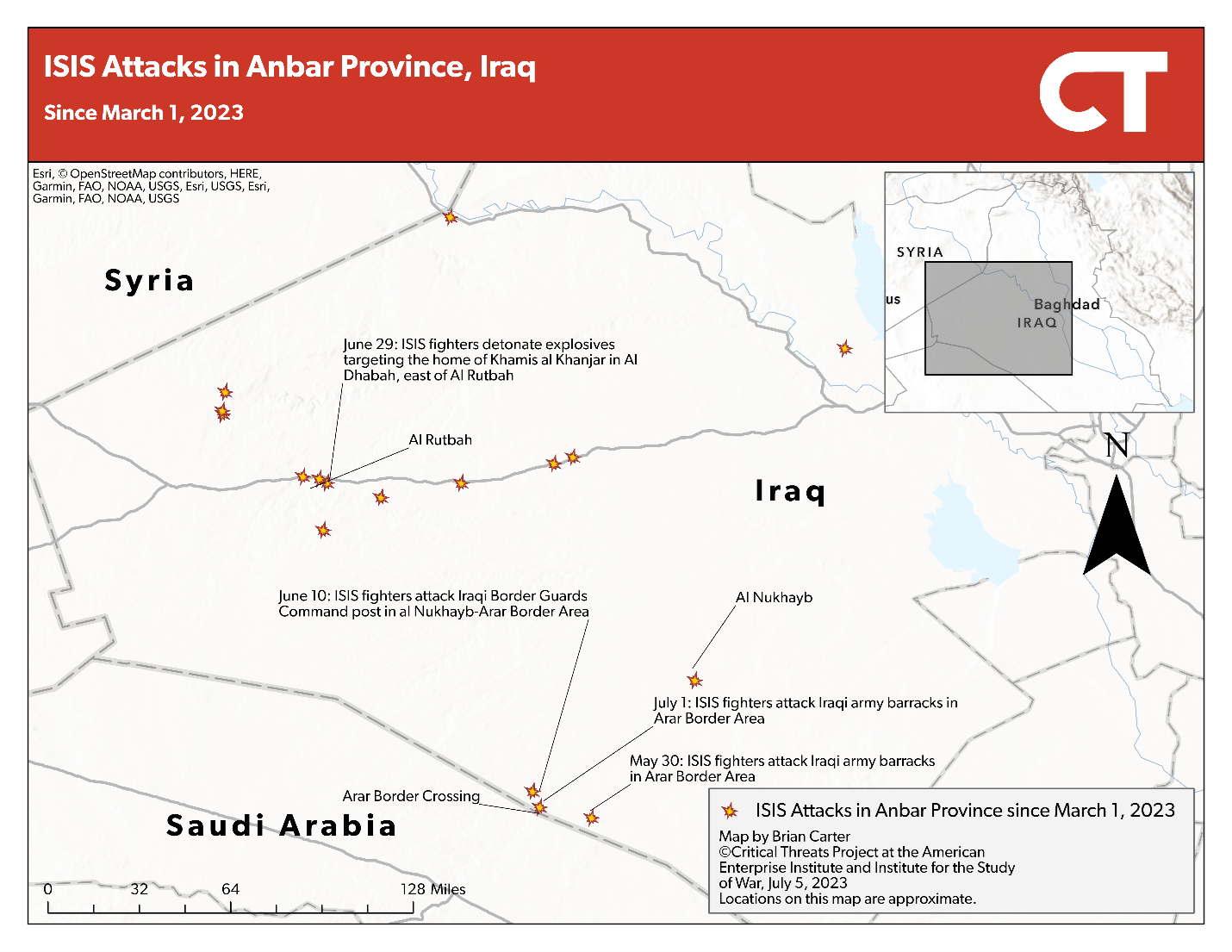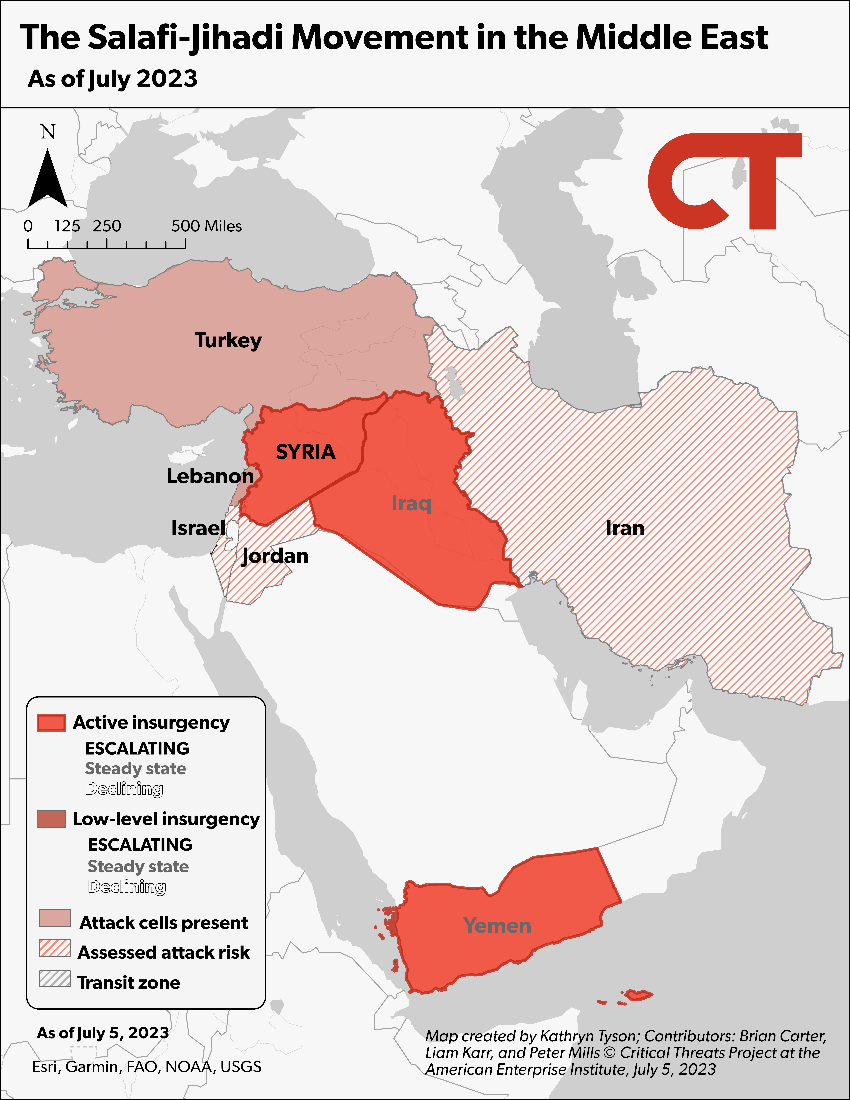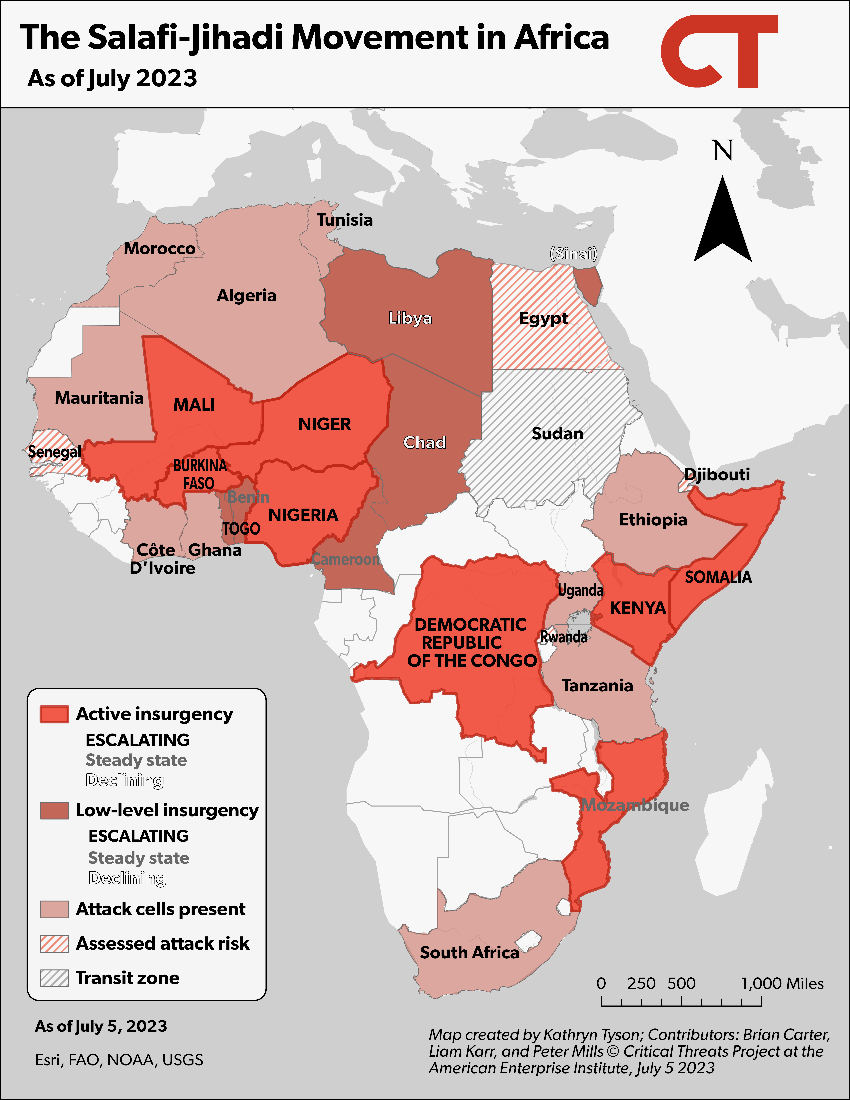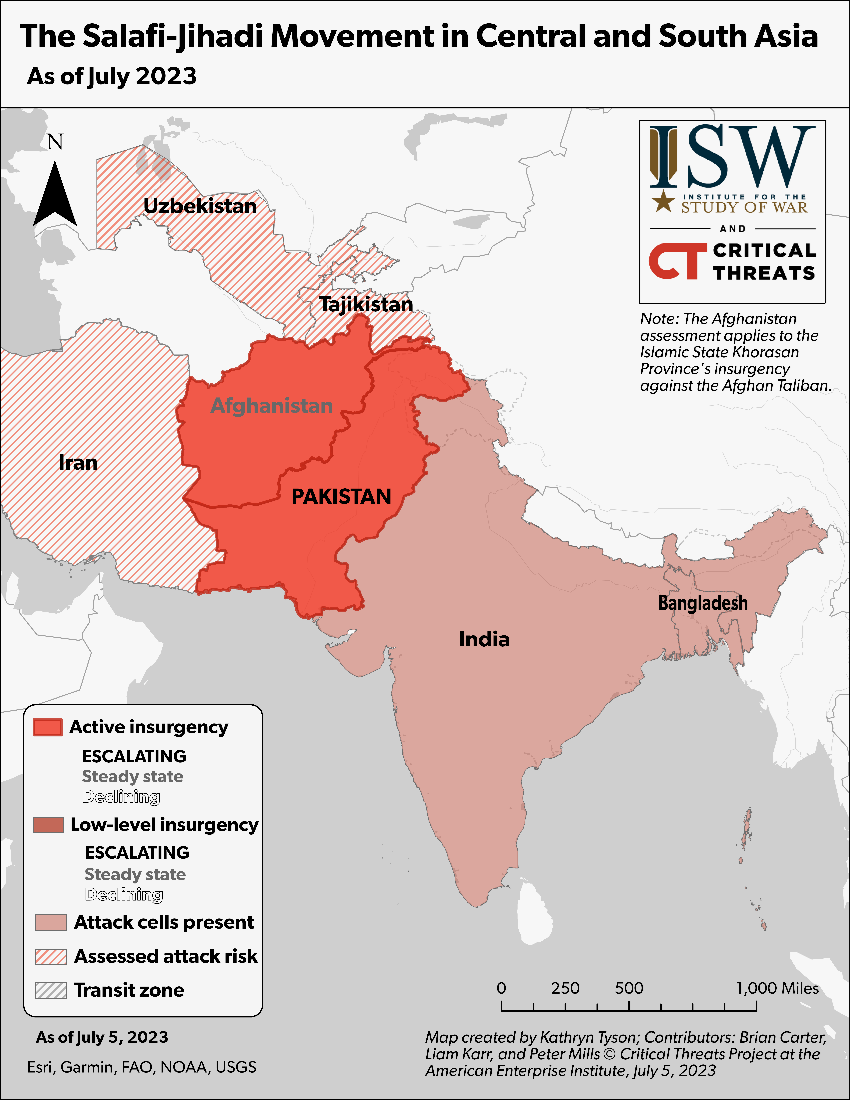 |
 |
Salafi-Jihadi Movement Weekly Update, July 5, 2023

Salafi-Jihadi Movement Weekly Update, July 5, 2023
Authors: Brian Carter, Kathryn Tyson, Liam Karr, Peter Mills, and Karolina Hird
Data Cutoff: July 5, 2023, at 10 a.m.
Key Takeaways:
Iraq and Syria. ISIS conducted three attacks in Iraq near a border crossing in Saudi Arabia, possibly signaling the group’s intent to challenge Saudi Arabia’s religious legitimacy by threatening Hajj pilgrims. ISIS’s lack of strong relationships with the tribes in northern Saudi Arabia makes crossing the border extremely difficult. The location of the attacks and ISIS’s limited capability in Saudi Arabia suggests ISIS sought to message its intent rather than try to access the Saudi side of the border.
Africa. The Wagner Group will continue operating in Africa following the group’s armed rebellion and is very unlikely to decrease its activity on the continent. Wagner’s continued presence in Africa is imperative to Russia’s foreign policy objectives on the continent, as it uses the group to gain access to natural resources that it uses to evade and mitigate Western sanctions and undermine Western influence on the continent. The group’s continued activity in Mali will almost certainly continue fueling the Sahel’s Salafi-jihadi insurgency.
Afghanistan-Pakistan. The Afghan Taliban, al Qaeda, and Tehrik-e Taliban Pakistan (TTP) participated in a rhetorical campaign to denounce the burning of a Quran in Sweden on June 28. These groups have a symbiotic relationship and remain fundamentally aligned. The Taliban is caught between satisfying its hard-liners, who support continuing ties to Salafi-jihadi groups, and engaging with foreign countries to seek economic support and international recognition. Islamic State Khorasan Province (ISKP) will likely exploit this tension to try to recruit disaffected Taliban hard-liners alienated by the Taliban government’s ties to foreign governments.
Assessments:
Iraq and Syria. ISIS claimed responsibility for three attacks in Iraq near a border crossing with Saudi Arabia, possibly signaling its intent to challenge Saudi Arabia’s religious legitimacy by threatening Hajj pilgrims entering from Iraq. Saudi Arabia derives its legitimacy in part from its custodianship of Mecca and Medina.[1] ISIS lacks the ability to carry out cross-border attacks due to its lack of relationships with northern Saudi tribes.[2] The Iraqi interior minister visited the Arar border crossing on June 2 to review security for the Hajj after Iraq deployed additional forces between Arar and Nukhayb.[3] ISIS claimed three attacks against Iraqi military posts in the “Arar border area” but did not specify a precise location for any of the attacks.[4] The location of the attacks suggests ISIS sought to message its intent rather than try to access the Saudi side of the Iraqi-Saudi border. ISIS uses its media to signal its intent to supporters and fighters to generate funds and communicate aspirations.[5]
Figure 1. ISIS Attacks in Anbar Province, Iraq, Since March 1, 2023
Source: Brian Carter.
Al Rutbah, Anbar Province. ISIS also targeted the home of prominent Sunni politician Khamis al Khanjar east of Al Rutbah, Anbar province, on June 29, likely to emphasize ISIS’s continued relevance in Iraq amid a historic low in ISIS activity.[6] ISIS did not clarify if Khanjar, who leads the Sunni Determination Alliance opposed to Iraqi Parliamentary Speaker Mohammed Halbousi, was at this residence. ISIS said that the attack was a “reminder to all leaders of . . . [Shi’a] or Sunni traitors” that ISIS will target them.[7]
Figure 2. The Salafi-Jihadi Movement in the Middle East
Source: Kathryn Tyson.
Africa. The Wagner Group will continue operating in Africa following the group’s armed rebellion and is very unlikely to decrease its activity on the African continent. The Wagner Group launched an armed rebellion in Russia on June 23 aimed at forcing leadership changes in the Russian Ministry of Defense (MOD).[8] The rebellion came to an end on June 24 after Wagner financier Yevgeny Prigozhin agreed to a deal on the fate of Wagner with Belarusian dictator Alexander Lukashenko.[9]
Several Kremlin officials subsequently assured that Wagner will continue operating in Africa regardless of the outcomes of the deal for Wagner in Russia, strongly suggesting the group will continue its activities on the continent. Russian Foreign Minister Sergei Lavrov stated on June 26 that Wagner will continue operating in the Central African Republic and that the Malian government turned to Wagner “with a request to ensure the safety of their leadership.”[10] Russian Foreign Ministry Spokesperson Maria Zakharova noted on June 28 that Wagner’s presence in Africa is a matter of host nation intention, stating that “it is the sovereign right of states to invite and sign contracts with those who are effective and most useful.” Lavrov echoed this point on June 30.[11]
Unofficial Russian sources indicate that the Kremlin will not reduce Wagner’s presence in Africa. The Russian outlet Vedomosti cited an unnamed source close to the Russian MOD who said that “projects to provide security services in Africa and other countries are not curtailed.”[12] A prominent Russian milblogger praised this approach and emphasized that it is imperative for Wagner to continue its mission to “re-decolonize” Africa despite the political ramifications of Prigozhin’s armed rebellion.[13]
Wagner’s continued presence in Africa is imperative to Russia’s foreign policy objectives on the continent. Putin’s assertion that the Russian MOD funds Wagner highlights the group’s role as a Russian government-funded foreign policy tool.[14] Russia exploits Wagner’s partnerships with African governments to gain access to natural resources that it uses to evade and mitigate Western sanctions.[15]
Wagner has a significant presence in at least five African countries: the Central African Republic, Libya, Madagascar, Mali, and Sudan.[16] Many of these governments pay Wagner by granting them access to valuable natural resource deposits, such as gold, oil, and chromite.[17] The Kremlin also uses Wagner’s partnerships to advance its strategic goals of countering Western influence and reestablishing Russia as a global power.[18] Russia has explicitly targeted France and former French colonies as part of this strategy.[19] These relationships help Russia expand its military footprint through Wagner deployments and other military deals.[20] The partnerships also provide Russia with potential votes to help it escape isolation in international bodies such as the United Nations, which Russia used as a component of its international political strategy following its invasion of Ukraine.[21]
It remains unclear whether Wagner will continue operating in Africa as an independent entity or as a formalized unit subordinated to the MOD. Some unofficial Russian sources have suggested that Wagner will continue operations in Africa as a nominally independent entity via Belarusian military infrastructure. A Belarusian insider Telegram channel claimed on June 26 that Wagner will be “legitimized” in Belarus and continue to operate in Africa.[22]
Russian opposition outlet Meduza cited former Wagner Commander Marat Gabidullin and another Wagner veteran who suggested that Prigozhin told Wagner fighters who followed him to Belarus after the armed rebellion they could retain projects in Africa.[23] The Wagner veteran claimed Wagner will use aircraft and logistical support from the Belarusian MOD to support operations in Africa, thus replacing the Russian MOD.[24] A prominent Russian milblogger posited that Belarus may become a “transit country” for Wagner to access Africa.[25] This course of action, however, is unlikely given the Kremlin’s vested interest in pursuing objectives in Africa and the ongoing campaign to officially formalize and subordinate Wagner to the Russian MOD.
Wagner will almost certainly continue fueling the Sahel’s Salafi-jihadi insurgency. Wagner has undermined security in Mali by working with Malian officials to force the withdrawal of more-capable French and UN forces.[26] Wagner has also strengthened al Qaeda– and Islamic State–linked insurgents by increasing human rights abuses that serve as a free recruitment tool by driving targeted communities to partner with jihadists for protection.[27] These actions have contributed to the spread of these Salafi-jihadi insurgents since Wagner arrived in 2021.
Wagner has not stopped al Qaeda–linked militants from increasing their rate of attacks in politically sensitive areas of southern and western Mali or stopped the local Islamic State affiliate from expanding across northeastern Mali.[28] Al Qaeda–linked militants also remain entrenched in central Mali despite an increase in the rate of joint Malian army–Wagner operations in 2023.[29] Wagner’s successful push to end the UN mission will further strengthen the momentum of both al Qaeda– and Islamic State–linked insurgents in northern Mali.[30]
Figure 3. The Salafi-Jihadi Movement in Africa
Source: Kathryn Tyson.
Afghanistan and Pakistan. The Afghan Taliban, Tehrik-e-Taliban Pakistan (TTP), and al Qaeda’s South Asia affiliate (AQIS) released similar statements condemning the burning of a Quran in Sweden on June 28. The Taliban and TTP both released statements on June 29 calling on the Organization of Islamic Cooperation, an Islamic grouping of 57 countries, to “take all appropriate measures to such heinous actions.”[31] Hardline TTP faction Jamaat ul Ahrar (JuA) released a statement on June 29 calling on Muslims in Europe to take violent action against the perpetrators of the Quran burning incident.[32] AQIS released a statement on July 1 that echoed JuA’s sentiments and called for violence against the perpetrators and against the US and Europe.[33] A Taliban commander published a video of a rocket destroying the Swedish flag on June 29 and incited “AQ [al Qaeda] brothers” to punish those responsible for the Quran burning on July 1.[34] The Islamic State has not yet condemned the incident, distinguishing the Taliban, TTP, and AQIS campaign as separate from a broader jihadist response.
The Taliban, TTP, and al Qaeda have close relations and remain fundamentally aligned. Al Qaeda and the TTP have expanded operational capabilities and gained greater freedom of movement under the Taliban government. The UN reported in June 2023 that the Taliban has appointed al Qaeda members to leadership positions in the Taliban government.[35] The Taliban provides safe havens for TTP leadership and fighters and supports TTP operations into Pakistan with material and logistical assistance.[36] Al Qaeda trains TTP fighters in training camps in Afghanistan and supports the TTP by enabling the TTP to work around Taliban-imposed restrictions, according to the UN report. AQIS has frequently voiced support for the TTP through its propaganda.[37]
The Taliban government’s rhetorical response to recent comments by US President Joe Biden indicates it remains stuck between satisfying hard-liners in the movement and addressing its economic crisis. The Taliban’s ideology demands it asserts independence from the international community, but the Taliban also seeks sanctions relief from the US to improve its economic situation.[38]
Biden said on June 30 that al Qaeda was not present in Afghanistan.[39] The Taliban spokesperson used Biden’s statement to refute UN reports alleging that foreign terrorists are based in Afghanistan.[40] The Taliban government argues it is following its commitments not to shelter foreign militants and deserves international recognition and the lifting of sanctions on Afghanistan. The Islamic State Khorasan Province (ISKP) released propaganda that highlighted Biden’s remarks to frame the Taliban government as subservient to the US.[41] The Taliban spokesperson implicitly refuted this by arguing that the Taliban is independent of the US because it is still subject to US sanctions.[42] The Taliban may desire greater economic engagement with the US, but it is unable to shed its ties to terrorist organizations and must continue to satisfy hard-liners in the movement, lest they defect to ISKP.
ISKP will likely exploit the Taliban’s dilemma between advancing economic engagement and satisfying hard-liners, to support ISKP’s efforts to infiltrate Taliban security forces. As CTP previously assessed, ISKP maintains infiltrators and sympathizers within the Taliban’s ranks.[43] ISKP uses its propaganda to try to recruit hard-line dissidents within the Taliban movement.[44] The Taliban’s conflicting response around Biden’s remarks and efforts to purge ISKP sympathizers indicate it remains concerned about Taliban hard-liners defecting to ISKP.[45]
Figure 4. The Salafi-Jihadi Movement in Central and South Asia
Source: Kathryn Tyson.
[1] https://ecfr.eu/article/commentary_saudi_arabia331
[2] https://themedialine.org/by-region/islamic-state-threatens-saudi-arabia-after-allies-normalize-ties-with-israel
[3] https://ninanews dot com/Website/News/Details?Key=1057262
[4] https://jihadology.net/wp-content/uploads/_pda/2023/06/The-Islamic-State-al-Naba%CC%84-Newsletter-394.pdf; https://jihadology.net/wp-content/uploads/_pda/2023/06/The-Islamic-State-al-Naba%CC%84-Newsletter-395.pdf; ISIS claim available on request.
[5] https://icsr.info/wp-content/uploads/2017/02/ICSR-Report-Media-Jihad-The-Islamic-State%E2%80%99s-Doctrine-for-Information-Warfare.pdf; https://extremism.gwu.edu/sites/g/files/zaxdzs5746/files/The_Long_Jihad.pdf; https://works.swarthmore.edu/cgi/viewcontent.cgi?article=1004&context=swarthmoreirjournal
[6] https://jihadology.net/wp-content/uploads/_pda/2023/06/The-Islamic-State-al-Naba%CC%84-Newsletter-397.pdf; https://musingsoniraq.blogspot.com/2023/07/violence-continues-to-drop-in-iraq-in.html#more
[7] https://jihadology.net/wp-content/uploads/_pda/2023/06/The-Islamic-State-al-Naba%CC%84-Newsletter-397.pdf
[8] https://understandingwar.org/backgrounder/russian-offensive-campaign-assessment-june-23-2023
[9] https://www.understandingwar.org/backgrounder/russian-offensive-campaign-assessment-june-24-2023; https://understandingwar.org/backgrounder/russian-offensive-campaign-assessment-june-25-2023
[10] https://russian.rt dot com/world/article/1166794-lavrov-intervyu-rt
[11] https://www.newsweek.com/africa-russias-wagner-group-too-big-fail-putin-knows-it-1809442; https://www.aljazeera.com/news/2023/6/30/future-of-wagner-contracts-up-to-african-states-russias-lavrov
[12] https://www.vedomosti dot ru/politics/articles/2023/06/30/983060-vagner-ne-otpravyat-v-zonu-spetsoperatsii
[13] https://t.me/boris_rozhin/90821
[14] http://kremlin dot ru/events/president/news/71535#sel=15:1:DkW,15:52:xTa
[15] https://www.cbsnews.com/news/russia-wagner-group-ukraine-war-putin-prigozhin-africa-plundering-resources
[16] https://russianpmcs.csis.org
[17] https://thesoufancenter.org/intelbrief-2022-may-2
[18] https://www.understandingwar.org/sites/default/files/ISW%20-%20The%20Kremlin%20Campaign%20in%20Africa%20-%20August%202019.pdf
[19] https://jamestown.org/program/the-hybrid-role-of-russian-mercenaries-pmcs-and-irregulars-in-moscows-scramble-for-africa
[20] https://www.understandingwar.org/sites/default/files/ISW%20-%20The%20Kremlin%20Campaign%20in%20Africa%20-%20August%202019.pdf; https://www.sipri.org/sites/default/files/2022-03/fs_2203_at_2021.pdf
[21] https://jamestown.org/program/the-hybrid-role-of-russian-mercenaries-pmcs-and-irregulars-in-moscows-scramble-for-africa; https://www.chathamhouse.org/2022/03/un-vote-russia-invasion-shows-changing-africa
[22] https://t.me/belarusian_silovik/17171
[23] https://meduza dot io/feature/2023/06/28/vernulis-obratno-moemsya-chistimsya-otdyhaem
[24] https://meduza dot io/feature/2023/06/28/vernulis-obratno-moemsya-chistimsya-otdyhaem
[25] https://t.me/boris_rozhin/90533
[26] https://www.reuters.com/world/africa/un-security-council-ends-peacekeeping-mission-mali-2023-06-30; https://www.criticalthreats.org/briefs/africa-file/africa-file-burkina-faso-coup-signals-deepening-governance-and-security-crisis-in-the-sahel
[27] https://www.criticalthreats.org/briefs/africa-file/africa-file-wagner-group-in-burkina-faso-will-help-the-kremlin-and-hurt-counterterrorism; https://ctc.westpoint.edu/how-the-wagner-group-is-aggravating-the-jihadi-threat-in-the-sahel
[28] https://www.criticalthreats.org/analysis/salafi-jihadi-movement-weekly-update-april-5-2023#Mali20230405; https://www.criticalthreats.org/analysis/salafi-jihadi-movement-weekly-update-may-24-2023#Mali20230524
[29] https://www.criticalthreats.org/analysis/salafi-jihadi-movement-weekly-update-april-27-2023#Sahel20230427
[30] https://www.criticalthreats.org/analysis/salafi-jihadi-movement-weekly-update-june-21-2023#Mali20230621
[31] https://twitter.com/AfghanAnalyst2/status/1674683199329382401; https://twitter.com/khorasandiary/status/1675412949630943232
[32] https://twitter.com/zarrar_11PK/status/1674366104100126721
[33] SITE Intelligence Group, “AQIS Demands Beheading, Exacting Harsh Retribution Against Qur’an Burners and Governments Behind Them,” July 2, 2023, available by subscription at www.siteintelgroup.com.
[34] https://twitter.com/BadriKhurasani/status/1675114146764038145; https://twitter.com/BadriKhurasani/status/1674329243621138435
[35] https://www.longwarjournal.org/wp-content/uploads/2023/06/UN-Sanctions-Monitoring-report-Afghanistan-14th.pdf
[36] https://www.rferl.org/a/pakistan-taliban-commanders-killed-abdul-wali/31977631.html
[37] https://twitter.com/khorasandiary/status/1642045878050463745; https://twitter.com/khorasandiary/status/1579513443027423232; https://twitter.com/khorasandiary/status/1560187012480700416
[38] https://www.stimson.org/2022/afghanistan-under-the-taliban-findings-on-the-current-situation
[39] https://www.rferl.org/a/afghanistan-taliban-biden-al-qaeda-remark/32484936.html
[40] https://twitter.com/QaharBalkhi/status/1675013640800419843?s=20; https://twitter.com/Zabehulah_M33/status/1675245636940099584
[41] https://twitter.com/AfghanAnalyst2/status/1675841089574453248
[42] https://twitter.com/Zabehulah_M33/status/1675245636940099584
[43] https://www.understandingwar.org/backgrounder/salafi-jihadi-movement-weekly-update-april-5-2023; https://www.aljazeera.com/news/2021/11/4/afghanistan-taliban-leader-warns-against-turncoats-infiltrators
[44] https://www.crisisgroup.org/asia/south-asia/afghanistan/afghanistans-security-challenges-under-taliban
[45] https://www.understandingwar.org/backgrounder/salafi-jihadi-movement-weekly-update-april-5-2023



